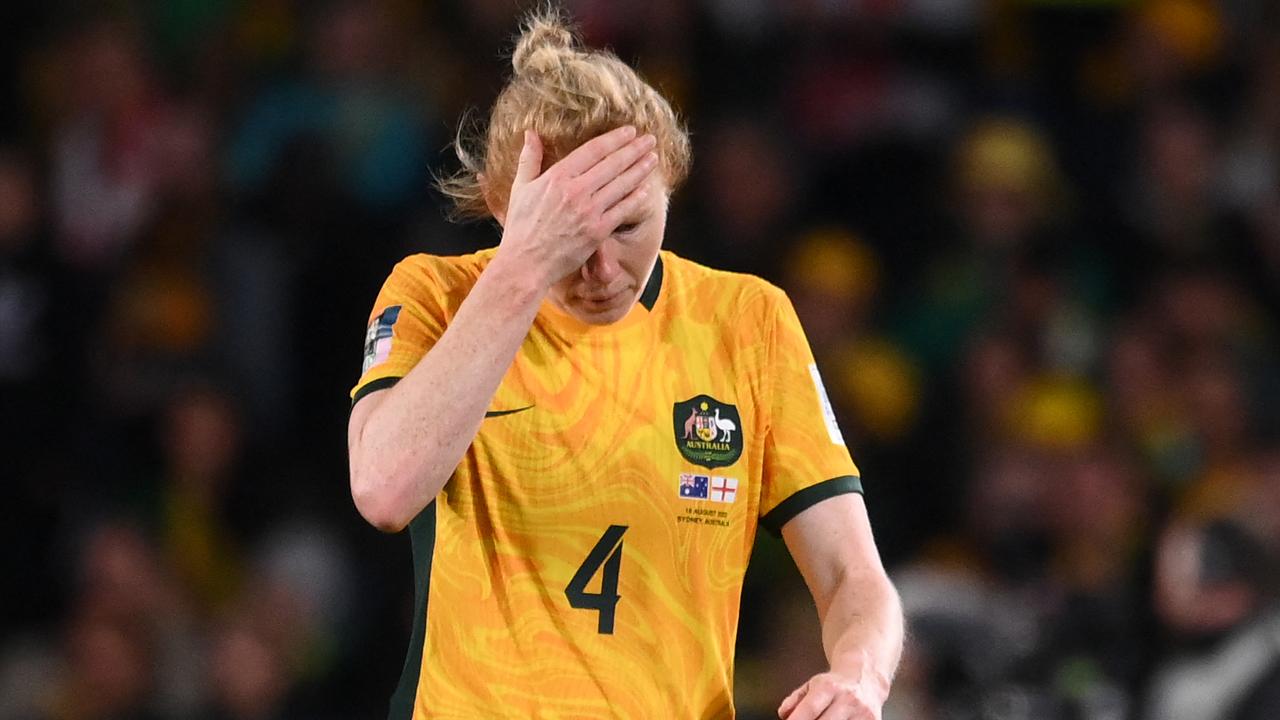It wasn’t to be for the Matildas as they went down 3-1 to England in their World Cup semi final at Stadium Australia.
The Aussies were up against it before a ball was even kicked on Wednesday night due to a late withdrawal, forcing a unit that hadn’t conceded a goal in three games to be altered.
Gustvasson’s side were also met by a brutal approach that showcased the mentality of what it truly takes to be a champion.
Foxsports.com.au breaks down the big moments from the Matildas’ clash in Talking Points!
FIBA Basketball World Cup | Starts Aug 25. Watch every Boomers, Team USA and Finals game FREE & LIVE on ESPN with Kayo Freebies. Join Kayo now and start streaming instantly >
Dream OVER as Tillies tumble out | 00:32
MORE COVERAGE
Last Waltz: Matildas’ World Cup dream ends as Poms through after all-time Kerr stunner
Player Ratings: Kerr left to rue golden chances; Aussie star made to pay for costly error
‘If I’d trained more than 5 times’: Kerr’s World Cup heartbreak written all over her face
THE CURVEBALL THAT BROKE UP STEELY BACKLINE
“I think consistency and chemistry is key for any team that wants to be successful in tournaments, and availability is another thing that’s key to be successful in tournaments.”
They were prophetic words from Matildas coach Tony Gustavsson yesterday’s press conference.
Perhaps he had an inkling then that centre-back Alanna Kennedy was battling an illness that ruled her out of Wednesday’s semi-final –the defender was so sick that she did not even attend the match.
Kennedy and the entire five-player defensive unit (goalkeeper Mackenzie Arnold, fullbacks Steph Catley and Ellie Carpenter, and centre-backs Kennedy and Clare Hunt) had started all five previous games and played every minute of the tournament together – 548 minutes before the semi-final.
But Kennedy’s issue forced a late reshuffle, with Gustavsson revealing in his press conference that the decision was only made at lunch on Wednesday.
“It seems to be one of those tournaments where curveball after curveball are thrown at us. I think the team have been tremendous at being able to adapt at whatever is thrown at us.
“At lunchtime today we got the notice from the medical team that Alanna was ruled out. (We) had to make a last-minute change.
“We’ve had a lot of those in this tournament, (but we’ve) been really really good at dealing with it.”
England golazo leaves stadium silenced | 00:32
Polkinghorne is a dependable veteran and put in a solid shift – and this is not to say that Kennedy being available would have changed anything.
But in the biggest game of their lives, against an incredibly dangerous attack, the Matildas’ defence and its new combinations looked shaky at times.
The key takeaway is a broader one: Australia was dealt an unfortunate blow just hours before the biggest game of their lives. It was the same earlier in the tournament, when Kerr suffered her own injury blow two days before the opening match against Ireland.
All tournament, the Australians have shown impressive resilience and an ability to roll with the punches – especially when they copped a shock loss to Nigeria and needed to bounce back quickly.
But tonight might just have been one blow too many. Tournaments aren’t just about tactics or skill. It can come down to luck – and the Matildas were just plain unlucky.

ENGLAND DEMONSTRATE MASTERY OF FOOTBALL’S DARK ARTS IN ‘BRUTAL’ BATTLE
England may have played ugly, they may have kicked a number of Matildas from pillar to post and they may have been a little cheeky with running down the clock.
But it ultimately proved to be a successful tactic from Sarina Wiegman’s side, even if it drew the vocal ire of the 75,000-plus fans at Stadium Australia.
It took just 10 minutes for referee Tori Penso to brandish the first yellow card of the game when Alex Greenwood hacked down Sam Kerr with a scything tackle.
By half time, England had given away nine fouls to Australia’s measly one.
Matildas boss Tony Gustavsson was left a little stunned as to just how physical the game had become.
“First of all, it was a great battle in there,” Gustavsson said.
“Hard, tough, no-one shied away.
“Glad we had the referee out there to protect the players on both sides because it was brutal at times.”
Optus Sport’s Chloe Logarzo felt the Matildas should have known England would be incredibly physical in the semi-final, especially since Penso seemed somewhat reluctant to continue dishing out cards.
“Look, the girls 100 per cent knew that this was going to happen,” Logarzo said at halftime.
“65 per cent of the girls on that field play against these girls in England and that’s exactly how they play. This isn’t a tactic, it’s just how they play.
“They are very rough, they like to get stuck in and they know how to get inside people’s heads.
“So, it’s how are we going to roll with the punches because they are going to keep doing that and unless the ref starts to get into her back pockets with the yellow cards, it’s just going to continue.”
As the game wore on and England held onto their lead, each and every player in a blue shirt was more than happy to slow the game down.
Whether it be taking a few extra seconds on a throw-in, delaying the goal kicks or just being a general nuisance, England demonstrated a true mastery of the dark arts when they needed it most.
Of course, seeing out the game in such a way can only happen when you’re winning, a position the Matildas sadly were never in on Wednesday night.
‘NO TIME TO DWELL’: THE KEY MESSAGE DRIVING MATILDAS FORWARD AS HISTORY REMAINS IN THE BALANCE
Although the immediate heartbreak may be severe, the Matildas have only a few days to clear their heads because a bronze medal match against Sweden on Saturday awaits.
Yes, it may not be the medal the Aussies had hoped for at the start of the tournament but to finish third at a home World Cup is still a monumental achievement.
Gustavsson reminded his troops of the need to quickly move on from the bruising experience against England in his post-match huddle.
“Yes we’re disappointed we didn’t win, but you also need to be proud of yourself when you leave everything out there and we did,” Gustavsson said.
“But then I said we have no time to dwell on this. We have extremely limited time and if we get too emotionally dragged down on this one, we have no chance in the bronze medal game.”
The message certainly rubbed off on his players as Katrina Gorry, Ellie Carpenter and Kyra Cooney-Cross all spoke after the game of their desire not to leave their home tournament “empty-handed.”
Last time Australia and Sweden met, the Aussies battered them 4-0 in front of 22,000 fans in Melbourne.
This time around, the Matildas will be roared on by over twice that crowd figure in Brisbane on Saturday.
Granted, some of the joy surrounding the Matildas’ run might have been sucked out after the loss to England.
But Gorry had one demand for fans.
“There’s still so much to go for,” Gorry said.
“Don’t jump off the bandwagon now, keep on coming and we’re sure we’ll make you proud.”
Granted, the ability to mentally move on might be quicker than the physical ability to do so.
Carpenter, Mackenzie Arnold, Clare Hunt, Steph Catley and Caitlin Foord have played every minute of the World Cup so far and will almost certainly be expected to back up in time for Sweden.
Workhorse midfield duo Katrina Gorry and Kyra Cooney-Cross also put in a significant shift against England, especially since the Lionesses outnumbered them in the middle of the park.
But with a medal on the line, the Matildas can no doubt dip into their energy reserves for one final time at this World Cup.
‘YOU LEARN A LOT’: THE ‘MASSIVE’ SILVER LINING IN DEFEAT
The Matildas were playing in their first semi-final, after previously falling short at the quarter-final stage three times (2007, ’11, ’15).
England, by contrast, had reached the quarter-finals in 1995, 2007 and 2011, before losing in the semi-finals at the latest two tournaments (2015 and 2019). They also won last year’s European Championships and beat Brazil in the first-ever Finalissima – a battle between the European champions and the South American Copa America champions in front of over 83,000 fans at Wembley Stadium.
The Lionesses were significantly more experienced at the deep stages of tournaments. But as painful as the defeat was, the Matildas will benefit from their experience at this Cup.
Vice-captain Steph Catley said: “It does take a while and we’ve made enough quarter-finals, enough round of 16s.
“You learn a lot from those moments. Some of these young girls that have just stepped in, and they’ve now played in a semi-final, they’re going to learn so much and they’re going to be so much more prepared for the next time it comes around.
“The fact that they’ve got that so early in their careers is massive.”
Veteran defender Clare Polkinghorne said the team will only get stronger – but added they will miss the incredible home support in future tournaments.
“I think we will,” she said. “But I don’t know – being at home, a lot of people were getting behind us and supporting us. It was just incredible the amount of support we got.”
Asked about whether this tournament was ‘premature’ for the Aussies to hope for a final, given it was their first semi-final appearance, coach Tony Gustavsson said: “I see where the question comes from but I have to say that I’m happy that people believed we can win this tournament and we’ve felt that belief. We’ve had it internally for a very, very long time… I don’t think it’s too early, but I also think it’s just the beginning of something.”
While many of the veteran players won’t be around in 2027, there’s an exciting young group of players that have taken the next step this tournament.
That includes Clare Hunt (24) and Ellie Carpenter (23) who played every minute for the Matildas in defence, while Charlotte Grant and Courtney Nevin (both 21) were also in the squad.
In midfield, 21-year-old Kyra Cooney-Cross played almost every minute and was exceptional, while Clare Wheeler (25) and Alex Chidiac (24) were also in the squad.
And up front, Cortnee Vine (25) and Mary Fowler (20) prove the future is bright.

